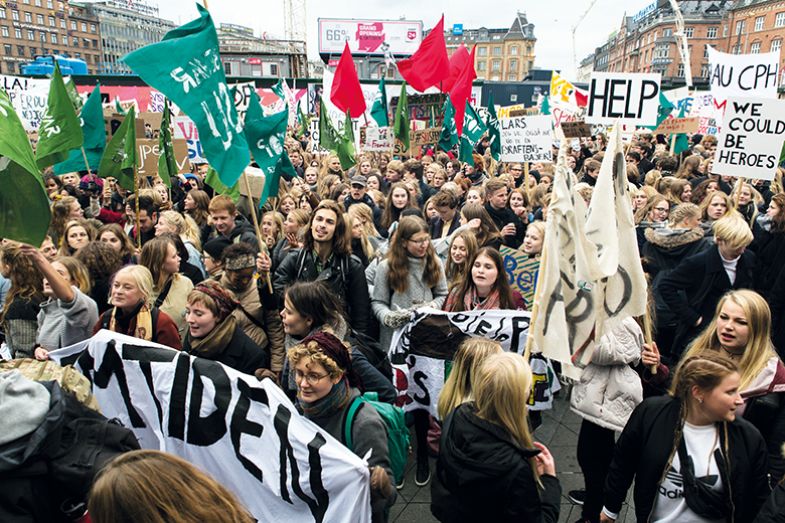The success of the Sweden Democrats in last September’s general election shocked many in Sweden and abroad. That a nationalist, anti-immigrant party had come second in a country famed for its tolerance struck many as a global high-water mark for the disgruntled, anti-establishment right.
In April, another second place, this time for the right-wing populist Finns Party in Finland’s general election, seemed to confirm that frustration with the “Nordic model” – an economic system typified by high taxes, a generous welfare state and mostly free higher education – was mounting in a region regularly found by the World Happiness Report to be the happiest on earth.
“There seemed to be a happy bargain between export-orientated companies, a liberal political elite and an acceptance of universities as being elitist, but also in the service of society, that prevailed in all of the Nordic countries, in one way or another,” says Mats Benner, dean of Lund University’s School of Economics and Management. Hence, universities “seemed to be immune” from political criticism.
Not any more. The Sweden Democrats are excluded from the coalition government but wield influence through political advisers and a confidence-and-supply deal in parliament. So far, they have mostly been content to focus on immigration and crime, but the remarkably close control the Swedish state has over academic institutions has put the sector on high alert. And the winds of change have already begun to blow.
In late April, the Swedish Education Ministry surprised universities by halving the length of the terms that the external members of their oversight boards could serve. This was done to allow an influx of security experts, amid widespread concerns about interference and intellectual property theft by Chinese, Iranian and Russian agents.
Rectors were outraged, with the 38 leading public universities writing that the move threatened the independence of their institutions and “could lead to significantly more politicised boards”. Bo Rothstein, emeritus chair in political science at the University of Gothenburg, wrote an opinion piece in the newspaper Dagens Nyheter calling on all external board members nationwide to show “civil courage” and resign immediately, rather than bend to the demand.
Rothstein says that “in all likelihood” the strange push for security figures on oversight boards – which meet only a few times a year and are not involved in security decisions around recruitment, partnerships or student vetting – had come from the Sweden Democrats, although the Education Ministry has denied the claim. The party itself did not respond to interview requests.
“Such parties want to colonise the state,” Rothstein says, referring to populists of the left and right and their “totalitarian” view of democracy, in which those representing the majority may impose their will on all aspects of the public sector, from libraries to lecture theatres. “Populist parties will try to have an influence on research about immigration, integration, of course gender studies, and climate change,” he predicts.
Lund’s Benner says boards are one of the places where wider political currents find expression in Swedish university policy, citing a wave of female and regional appointments as those two representation drives gained pace in recent years. “The notion that universities are somehow above politics is being tested and challenged,” he says, particularly as security scrutineers question whether academics are “trustworthy or reliable from a national perspective”.
Swedish universities rank in the lower half of European countries for their organisational and financial autonomy, according to a 2023 reckoning by the European University Association. But a global survey of academic freedom in the same year put Swedish academics in Europe’s upper half and the top 10 per cent worldwide, based on factors such as their freedoms to teach, research and express themselves, as well as levels of institutional autonomy and freedom from “politically motivated surveillance”.
The apparent contradiction can be explained by Sweden’s cultural respect for academic freedom despite the weak protections for it in law, according to Shirin Ahlbäck Öberg, a professor in Uppsala University’s department of government. “The state has historically been seen as benevolent,” she says, adding that the rise of populist parties has strengthened the arguments of those who have long called for expanding legal protections of academic freedom and transposing them from the university act into the constitution. “When we live in a more polarised world and there is not this consensus about these norms, then codifying is necessary,” she says.

Finland’s new right has climbed even higher than its Swedish cousins, becoming a full partner in the centre-right ruling coalition that formed in June. Juha Ylisalo, a postdoctoral researcher at the University of Turku, says it is still unclear whether academia should fear the “wild card” party, some of whose politicians are “highly critical” of academic elites while others are university-friendly doctorate holders.
But one area of higher education policy that the party could target is internationalisation – particularly the increasing use of English as a language of instruction. This isn’t just a political concern. It was students themselves who sparked a recent probe into the use of English at Finland’s Aalto University, which ended with a judge ruling that the institution had broken the law by offering just 5 per cent to 10 per cent of some master’s programmes in Finnish or Swedish, the national languages.
Taina Saarinen, director of the Finnish Institute for Educational Research at the University of Jyväskylä, sees parallels between what is currently happening in Finland and what has happened in Denmark, where “neo-nationalists” have employed the issue of language usage at university “as a proxy to say that there are problems with migration”.
Back at the turn of the millennium, when the Sweden Democrats were busy purging neo-Nazis from their membership, the Danish People’s Party (DPP) were parliamentary pioneers for the Nordic new right, winning 12 per cent of the vote in the 2001 election, a year that brought a relative drubbing for the Social Democrats after almost a century of dominance. The DPP provided the resulting minority centre-right government with parliamentary support, as the Sweden Democrats do today.
There are also parallels between Denmark’s trajectory and current events in Sweden, says Esben Schjørring, political editor of the online political newspaper Altinget.dk. Both he and Benner say Denmark has been a bellwether for political trends across the Nordic region. And that could bode ill for universities, as Denmark’s political mainstream has become increasingly antagonistic towards them in the two decades since the DPP’s political breakthrough.
In the late 2010s, Denmark’s then-centre-right coalition cut places for foreign students because it said too many were leaving the country after graduation, forcing leading universities to close English-language programmes. When the Social Democrats returned to power on an anti-immigration ticket in 2019, they continued a push against the humanities and backed a parliamentary motion condemning “excessive activism in certain research environments”, while their policy to strengthen small-town higher education came with the gutting of departments in big cities.
For Schjørring, who taught at the University of Copenhagen in the late 2000s, the Social Democrats’ current political positioning can be explained by the rise of the new right. “In some ways, you can say [the Social Democrats] have copied populist policies: that’s the typical criticism you get from the left. But I consider it to be much more profound than just copying. It’s a reinterpretation of what the social democratic project is, and I think one would have to see what is going on in education as part of that.”
Kaare Dybvad grew up in Holbæk, an industrial town in Zealand, Denmark’s poorest region. “My classmates who took humanities were unemployed or in very precarious work situations afterwards, but people from upper-middle-class families who took humanities always got a job because they called their uncle or something,” he says.
Dybvad is the Social Democrat minister for immigration and integration in the current coalition and has been an influential voice in his party on higher education since writing a 2017 book, The Tyranny of the Scholars: How the Creative Class Creates Inequality and Undermines the World's Best Society, in which he claimed that Denmark was ruled by a “tyranny” of scholars and was in thrall to the notion of a “creative class”. Universities that do not prepare students for well-paid and available jobs were failing as engines of social equality, he added, and the generous financial support provided to Danish students came with utilitarian strings attached: “When you have this kind of system, then of course you need to be more critical,” he says. “You can’t just have thousands of people studying theatre history.”
That conviction led last October to the Social Democrats’ unveiling of a major overhaul of master’s provision, shortening over a third of programmes from two years to one, with the proportion of truncated programmes rising to 70 per cent in the social sciences and humanities.
At the time, the government’s argument that shorter programmes would better prepare students for the labour market was rubbished by universities and the Danish Chamber of Commerce, which said two-year programmes allowed more time for internships. But after Denmark’s November election led to a coalition between the Social Democrats and their liberal and conservative rivals, the partners decided to develop the policy. Their fleshed-out plan, presented in March, doubled down on the claim that too many Danes were being prepared for academic jobs.
“We’re not after the humanities; we’re not trying to represent them worse than it is. But what we see in Copenhagen is that there’s a very high level of unemployment, and when we look at jobs that [humanities graduates] get, it’s usually not on an academic level,” Dybvad says, in response to the claims that the plans target the humanities.
Opposition parties published counterproposals that limited the changes – which were supported by only a quarter of Danes – to fewer programmes. “I would prefer that we didn’t do this. But if we have to do it, we should do it with a very small part of the student body so we can see what happens,” says Sofie Lippert, a member of parliament and education lead for the Green Left Party. “What is the quality of the education they’re getting? How do they use it afterwards?”
Stina Vrang Elias, director of the Copenhagen-based education and research thinktank DEA, says there are genuine problems with the typical Danish route through higher education – with most Danes finishing secondary school at 20 and taking a couple of gap years before starting undergraduate programmes skewed towards specific jobs.
The shift towards longer and more varied careers means that students should have more freedom to move between courses and return to study later in life, Elias says. But the proposed shortening of master’s courses “does nothing” to address such issues.
Moreover, the changes run counter to long-term Danish policy, which sees the “essence” of research universities as being about international academic competition, rather than satisfying labour market demands. For Elias, reform should focus on making existing vocational programmes at universities of applied science more attractive, rather than trying to compress more popular programmes at research universities.
After months of talks, in late June the government and opposition parties agreed to shorten a third rather than half of master’s courses, but also to cut enrolments on to bachelor’s programmes by 8 per cent. Jesper Langergaard, director of the umbrella body Universities Denmark, says introducing the cap is a “significant shift” in higher education policy, the implementation of which will take up a lot of universities’ bandwidth.

According to Agnete Vabø, a researcher at Oslo Met University and the Nordic Institute for Studies in Innovation, Research and Education, Danish politicians in general have tended to take an “instrumentalistic” approach to higher education and research, prioritising “efficiencies that can contribute to economic growth”, rather than “academic values and academic quality”.
But if a crackdown on international students is the first step down the Danish path, her own country has begun its journey.
Last autumn, the Norwegian government announced that Norway would become the final Nordic country to introduce tuition fees for international students from outside the European Union, Switzerland or the European Economic Area, to the dismay of many academics and students. Denmark made the switch in 2006, while Sweden and Finland followed in 2009 and 2017, respectively.
The ruling coalition of the social democratic Labour Party and the agrarian Centre Party said it expected non-European enrolments to plummet by 70 per cent as a result, but some Norwegians were sceptical about the government’s promise that the public money saved on international tuition would provide new resources for universities, while others lamented the death of what had been a core principle in the country’s higher education politics. For instance, dismay has been expressed about the closure of programmes in areas such as hydropower engineering, which were specifically pitched at students from some of the world’s poorest countries.
Nor is internationalisation the only flashpoint, after decades of bipartisan consensus on the value and trustworthiness of Norwegian academia. In May 2022, the country’s tough-talking research minister, Ola Borten Moe, a member of the Centre Party, fired the entire executive board of the country’s main research funder, the Research Council of Norway, over concerns about financial mismanagement.
Although the Centre Party tends to be more preoccupied with local teaching provision than cultural identity, the coalition went on, in June, to unveil an overhaul of Norway’s higher education act, including a plan to boost the use of Norwegian in universities by requiring international scholars to become competent speakers within three years.
That could hurt already tricky recruitment efforts, says Sunniva Whittaker, the rector of the University of Agder. Nor is she impressed by plans to grant parliament the power to decide whether costly and hard-to-staff satellite campuses should be closed, believing this to be an infringement of institutional autonomy.
Moe framed another higher education act amendment to protect academic freedom as allowing staff to voice “heretical thoughts”, an echo of the anti-cancel-culture bent of a similar campaign by Sweden’s education minister, Mats Persson, a liberal who claims that a silent majority of academics have been cowed by students and other activists.
“I’m surprised and shocked and wouldn’t have believed this a few years ago – that we actually have these discussions in the Nordic countries about how to protect academic autonomy,” says Oslo Met’s Vabø.

According to a recent survey by Terence Karran, emeritus professor of higher education policy at the University of Lincoln and a long-time scholar of Nordic higher education, many academics in the region still feel that their academic freedom is better protected than that of colleagues in other EU countries. Nevertheless, Karran’s view is that a coherent Nordic model of higher education seems to be fading.
While none of the Nordic new right parties have come out against free higher education for domestic students, Karran says populist politicians could take to social media to “shift the way in which university education is perceived” and begin to challenge access for some, such as recent immigrants.
“In the past, [higher education] was always seen as an entitlement to the indigenous population. Whether it will be an entitlement to those coming into the country in the longer term is another matter,” he says.
The mounting political scepticism about universities is a reversal of the position in 1990s, when Nordic universities were seen as a “Swiss knife” and “a force of employability, of global connection, of enterprise, optimism”, says Lund’s Benner. “It’s an indication of the strength [of the change of mood] that it comes from both [political] sides,” he notes. “It’s not merely a True Finns, Sweden Democrats thing; it’s also coming from the Centre Party in Norway.” Universities’ relationship with society is being “recalibrated”, he believes.
Gothenburg’s Rothstein sees the roots of that recalibration in the fracturing of “the alliance between the industrial working class and what one might call the intellectual-cultural left”, which previously sustained the centre-left vote. “The rise of populist parties in Western liberal democracies suggests that after more than 150 years, the alliance…is over,” he wrote in a paper published earlier this year, with populists depicting universities as being on the side of the elites – and leftists, who were once exercised by economic justice, now “interested in all kinds of identity questions instead”, even as economic inequality increases.
The massification of higher education will go some way towards protecting Nordic universities from populist accusations of elitism, but institutions could also help themselves by working harder on their relationship with society at large, Rothstein says. And he praises a recent biennial Nobel Prize outreach event in Gothenburg that attracted 4,000 people, indicating that the public demand for such outreach is there.
With the anti-establishment right making significant electoral inroads across Europe, the Nordic region is not the only one where universities may find their utility and modi operandi increasingly called into question. But it remains the most surprising.
“A happy corner of the world is now becoming perhaps a little less happy, a little more contentious, and exactly how that will play out remains to be seen,” reflects Benner. “How universities and funders and others will handle the malcontents: that is the big issue.”
Register to continue
Why register?
- Registration is free and only takes a moment
- Once registered, you can read 3 articles a month
- Sign up for our newsletter
Subscribe
Or subscribe for unlimited access to:
- Unlimited access to news, views, insights & reviews
- Digital editions
- Digital access to THE’s university and college rankings analysis
Already registered or a current subscriber?








